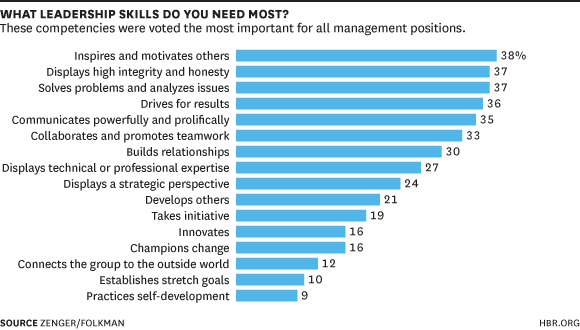The Skills Leaders Need at Every Level
Jack ZengerJoseph Folkman
JULY 30, 2014
A few weeks ago, we were asked to analyze a competency model for leadership development that a client had created. It was based on the idea that at different points in their development, potential leaders need to focus on excelling at different skills. For example, in their model they proposed that a lower-level manager should focus on driving for results while top executives should focus on developing a strategic perspective.
Intuitively, this makes sense, based as it is on the assumption that once people develop a skill, they will continue to exercise it. But, interestingly, we don’t apply it in athletics; athletes continue to practice and develop the same skills throughout their careers. And as we thought about the excellent senior executives we have met, we observed that they are, in fact, all very focused on delivering results, and many of the best lower level managers are absolutely clear about strategy and vision. This got us to wondering: Are some skills less important for leaders at certain levels of the organization? Or is there a set of skills fundamental to every level?
To see, we compiled a dataset in which we asked 332,860 bosses, peers, and subordinates what skills have the greatest impact on a leader’s success in the position the respondents currently hold. Each respondent selected the top four competencies out of a list of 16 that we provided.We then compared the results for managers at different levels.
As you might expect, the skills people reported needing depended not only on their level in the organization but also on the job they held and their particular circumstances. But even so, there was a remarkable consistency in the data about which skills were perceived as most important in all four levels of the organization we measured. The same competencies were selected as most important for the supervisors, middle managers, and senior managers alike, and six out of the seven topped the list for top executives. Executives at every organizational level, our respondents reported, need a balance of these competencies. The other nine competencies included in the study were chosen only half as frequently as the top seven.
This suggests to us that as people move up the organization, the fundamental skills they need will not dramatically change. Still, our data further indicate, the relative importance of the seven skills does change to some degree as people move up. So, in the graph above the top seven competences are listed in order of importance, as it happens, for the supervisory group. With middle managers, problem solving moves ahead of everything else. Then for senior management, communicating powerfully and prolifically moves to the number two spot. Only for top executives does a new competency enter the mix, as the ability to develop a strategic perspective (which had been moving steadily up the lower ranks) moves into the number five position.
What to make of all this? From our analysis we conclude that there is some logic to focusing on distinct competencies at different stages of development. But, more fundamentally, it shows us that there are a set of skills that are critical to you throughout your career. And if you wait until you’re a top manager to develop strategic perspective, it will be too late. Lack of a strategic perspective, our research has further indicated, is considered a fatal flaw even when your current job does not require it. Your managers want to see you demonstrate that skill before they promote you.
So it is useful to ask yourself which competencies are most critical for you right now. But it’s also critical to ask yourself which competencies are going to be most critical in the future for the next level job. Demonstrating those skills in your current job provides evidence that you will be successful in the next job.

